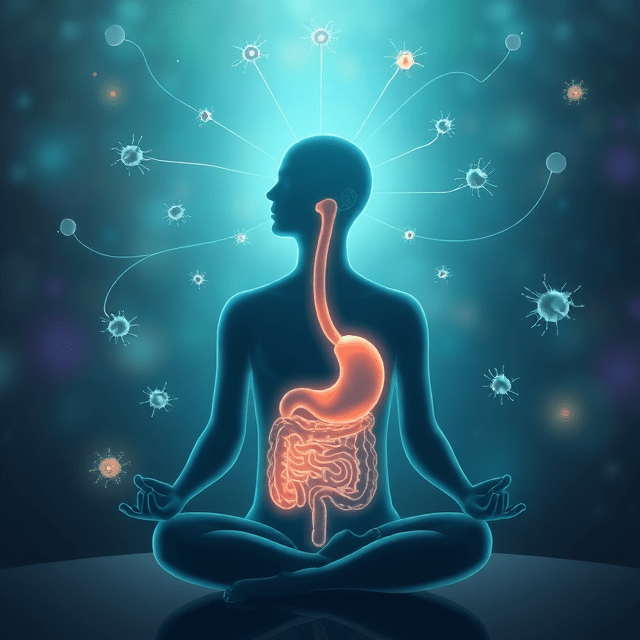
The Gut Microbiome and Its Relationship to Mindfulness
Discover the powerful connection between mindfulness and gut health. Learn how mindfulness practices can improve your gut microbiome, reduce stress, and enhance overall well-being and learn how your gut microbiome impacts mindfulness practices.
The Gut Microbiome and Its Relationship to Mindfulness: How Gut Health Impacts Mental Well-Being
The connection between the gut and the brain is often referred to as the gut-brain axis—a complex communication system that links the gastrointestinal tract with the brain. Emerging research has highlighted the profound influence of the gut microbiome on our mental health, emotional state, and overall well-being. In recent years, mindfulness practices have gained attention for their ability to support mental health, reduce stress, and enhance cognitive functioning. But how are these two distinct aspects—the gut microbiome and mindfulness—related?
This article explores the fascinating relationship between the gut microbiome and mindfulness, discussing how gut health affects mental well-being and how mindfulness practices can positively influence gut health. Additionally, we will look at scientific findings that demonstrate the bidirectional nature of this connection, offering insights into how improving one’s mental state through mindfulness can also benefit the gut, and vice versa.
Understanding the Gut Microbiome
The gut microbiome refers to the vast community of microorganisms (bacteria, viruses, fungi, and other microbes) that reside in the gastrointestinal tract. The human gut is home to trillions of these microbes, and they play a crucial role in digestion, immune function, and even mental health. It is estimated that the gut microbiome contains more than 100 trillion microorganisms, vastly outnumbering human cells in the body.
Each individual’s microbiome is unique, shaped by various factors such as diet, environment, genetics, and lifestyle. However, the diversity and balance of the gut microbiome are essential for optimal health. A balanced microbiome contributes to proper digestion, immune function, and the production of certain neurotransmitters that influence mood and mental clarity.
The Gut-Brain Axis: A Pathway for Communication
The gut-brain axis is the communication network that connects the gastrointestinal system with the brain. This bi-directional system allows signals from the gut to influence brain activity and vice versa. The axis is composed of several components, including the vagus nerve, the enteric nervous system (ENS), immune signaling, and hormones like serotonin and cortisol.
Notably, about 90% of the body's serotonin, a neurotransmitter associated with mood regulation, is produced in the gut. This underscores the importance of gut health for emotional and mental well-being. The microbiome influences the production and regulation of neurotransmitters like serotonin, dopamine, and gamma-aminobutyric acid (GABA), all of which are vital for mood and stress regulation.
The Impact of Gut Health on Mental Well-Being
-
Mood Regulation: Studies suggest that an imbalance in the gut microbiome, a condition known as dysbiosis, is linked to mental health disorders such as depression, anxiety, and stress. Dysbiosis can occur when harmful bacteria outnumber beneficial bacteria, disrupting the delicate balance of the microbiome. Research indicates that this imbalance can lead to increased inflammation, altered neurotransmitter production, and compromised gut-brain communication, all of which can negatively impact mental health.
-
Stress and Anxiety: Chronic stress can wreak havoc on both the gut and the brain. When stressed, the body produces high levels of cortisol, a hormone that is part of the body’s stress response. Elevated cortisol levels can disrupt the microbiome by promoting the growth of harmful bacteria and reducing the diversity of beneficial microbes. In turn, this imbalance can exacerbate feelings of anxiety and stress, creating a vicious cycle.
-
Immune Function and Inflammation: Inflammation plays a key role in mental health. Studies have shown that dysbiosis can lead to an overactive immune response, causing low-grade chronic inflammation. This inflammation has been associated with the development of mental health disorders such as depression, anxiety, and even conditions like autism and schizophrenia. A healthy, balanced microbiome helps to regulate inflammation, promoting a healthier immune response and supporting mental well-being.
How Mindfulness Affects Gut Health
Mindfulness is a mental practice that involves focusing on the present moment without judgment. Through techniques such as meditation, breathing exercises, and body awareness, mindfulness has been shown to reduce stress, improve emotional regulation, and enhance cognitive function. But how does mindfulness relate to gut health?
-
Reducing Stress and Cortisol Levels: Mindfulness practices are particularly effective in reducing stress and anxiety, two factors that negatively affect gut health. By activating the parasympathetic nervous system, which is responsible for the "rest and digest" response, mindfulness helps to lower cortisol levels, leading to reduced stress. This reduction in cortisol can, in turn, help maintain a healthy gut microbiome, as chronic stress has been shown to contribute to dysbiosis.
-
Improved Digestion: Mindfulness also promotes better digestion by encouraging a calm and focused state during meals. By engaging in mindful eating—paying attention to the taste, texture, and sensation of food—individuals may experience improved digestion and nutrient absorption. This is important for supporting the health of the gut microbiome, as proper digestion is essential for maintaining the right environment for beneficial bacteria to thrive.
-
Gut Motility and Vagus Nerve Stimulation: Mindfulness practices, particularly deep breathing exercises, can stimulate the vagus nerve, a key component of the gut-brain axis. The vagus nerve helps regulate gut motility (the movement of food through the digestive tract) and can have a calming effect on the gastrointestinal system. By enhancing vagus nerve activity through mindfulness, individuals may experience improved gut motility, reduced bloating, and better overall gut function.
-
Lowering Inflammation: Inflammation is a common result of both chronic stress and gut microbiome imbalances. Mindfulness has been shown to reduce systemic inflammation, which can benefit both mental health and gut health. Regular mindfulness practice has been linked to lower levels of inflammatory markers like C-reactive protein (CRP), which can help protect the gut from the negative effects of inflammation.
Scientific Evidence Supporting the Mindfulness-Gut Connection
Several studies have explored the relationship between mindfulness and gut health, shedding light on the potential benefits of incorporating mindfulness practices into a health regimen.
-
Mindfulness and Gut Microbiome: A 2017 study published in the journal Psychosomatic Medicine found that mindfulness meditation had a positive impact on the gut microbiome. Participants who practiced mindfulness showed an increase in the diversity of their gut microbiota, which is often associated with better health outcomes. The study suggested that mindfulness could help improve gut microbial balance, thus promoting better overall health.
-
Mindfulness and Stress Reduction: Research consistently shows that mindfulness can reduce stress and improve emotional regulation. A 2018 meta-analysis published in the journal Psychological Science found that mindfulness interventions significantly decreased symptoms of anxiety and depression. This is important because both anxiety and depression are linked to imbalances in the gut microbiome. By reducing stress through mindfulness, individuals may support a healthier gut microbiome.
-
Mindfulness-Based Stress Reduction (MBSR): Mindfulness-Based Stress Reduction (MBSR) is a structured program that combines mindfulness meditation and yoga to reduce stress and improve well-being. Studies have shown that MBSR can improve gut function and reduce symptoms of gastrointestinal disorders, such as irritable bowel syndrome (IBS), which is often linked to stress. MBSR participants have also been found to experience reduced inflammation, suggesting a positive effect on both mental and physical health.
The Bidirectional Relationship Between Mindfulness and the Gut Microbiome
The connection between mindfulness and the gut microbiome is bidirectional, meaning that both influence each other. While mindfulness practices can support a healthy gut microbiome, a balanced microbiome can also enhance mindfulness and mental clarity.
-
Gut Health Supporting Mindfulness: A healthy gut microbiome can improve mood and cognitive function, which can enhance mindfulness practices. When the gut is functioning optimally, the brain receives the necessary nutrients and neurotransmitters to support focus, attention, and emotional regulation. This can make mindfulness practices more effective and enjoyable.
-
Mindfulness Enhancing Gut Health: As mentioned earlier, mindfulness practices can reduce stress, lower inflammation, and improve digestion—all of which support a healthy gut microbiome. By engaging in regular mindfulness practices, individuals can improve their overall health, creating a positive feedback loop that enhances both mental and physical well-being.
Conclusion: Nurturing Your Gut and Mind Together
The gut microbiome and mindfulness are intricately connected, with each influencing the other in powerful ways. By maintaining a balanced and healthy gut microbiome, individuals can experience better mental health, improved emotional regulation, and greater resilience to stress. Conversely, practicing mindfulness can have a profound positive effect on gut health, helping to reduce stress, inflammation, and promote better digestion.
To cultivate both a healthy gut and a calm mind, consider incorporating mindfulness practices into your daily routine. Activities like meditation, mindful breathing, and mindful eating can help improve your mental state while supporting your gut health. Additionally, maintaining a nutritious diet, staying hydrated, and getting adequate sleep are key to supporting both your microbiome and your overall well-being.
In the modern world, where stress levels are high and gut health issues are common, embracing the connection between the gut microbiome and mindfulness can be a powerful tool for achieving optimal mental and physical health. By taking care of both your gut and mind, you set the foundation for a happier, healthier life.

